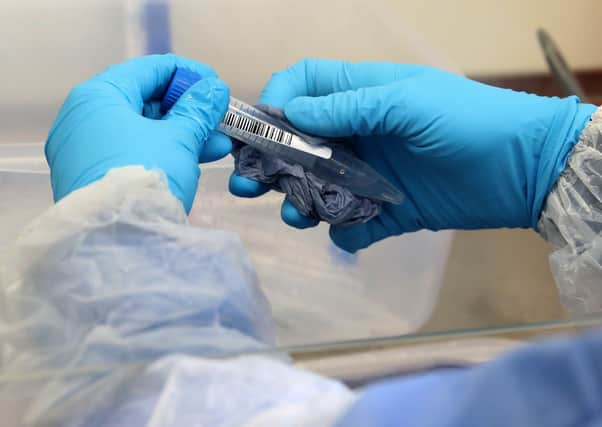Pet cat likely to have caught coronoavirus from its owners


Researchers from the University of Glasgow Centre for Virus Research and its school of veterinary medicine found the infected animal – believed to be the first in the UK – during a joint research programme which has seen hundreds of feline samples tested.
Follow-up tests by the UK’s animal and plant health agency confirmed the cat had tested positive and Glasgow scientists have now completed a full genome sequencing of the virus carried by the infected cat.
Advertisement
Hide AdAdvertisement
Hide AdMeanwhile, the British Veterinary Association has issued advice to pet owners in light of the discovery.
The pet cat, in England, had been diagnosed by a vet with feline herpes, a common respiratory infection in cats, but the sample was also tested for the SARS-CoV-2 virus as part of the research programme. The cat and its owners have since made a full recovery and no other animals or people in the household were affected.
Professor Margaret Hosie, from the University of Glasgow Centre for Virus Research, is one of the scientists working on this project. She said: “There have been sporadic reports of cats from Covid-19 households in Hong Kong, Belgium, France, Germany, Switzerland, Spain and the USA that tested positive for SARS-CoV-2 and were presumed to be infected from their owners, but this is the first report of an infected cat in the UK.
“All available evidence suggests that the cat was infected from its owners, who had previously tested positive. The cat and its owners have since made a full recovery and there was no transmission of the virus to other animals or people in the household.”
Advertisement
Hide AdAdvertisement
Hide AdProfessor William Weir, of the university’s vet school, added: “The factors that govern why one species is susceptible to the Covid-19 virus while others are more resistant are currently unknown, but will likely reveal more about how this virus spreads and causes disease.
“At present, there is no evidence that cats, dogs or other domestic animals play any role in the epidemiology of human infections with SARS-CoV-2.
“Furthermore, the significance of SARS-CoV-2 as a feline or canine pathogen is unknown as cats and dogs with reported infections usually recover and there has been no evidence of transmission occurring between cats or dogs in the field.”
BVA President Daniella Dos Santos said: “While pet owners may be worried by this news, we’d like to emphasise that there continues to be no evidence that infected pets can pass Covid-19 to their owners. There have been a tiny number of cases of Covid-19 in domestic animals worldwide and in all cases, it appears likely that the transmission was from infected humans to animals.”
Advertisement
Hide AdAdvertisement
Hide AdDuring the pandemic, naturally occurring infections have been reported in pet and stray cats as well as dogs. Ferrets and hamsters have also been found to be susceptible to the virus, but not ducks, chickens or pigs.
Comment Guidelines
National World encourages reader discussion on our stories. User feedback, insights and back-and-forth exchanges add a rich layer of context to reporting. Please review our Community Guidelines before commenting.